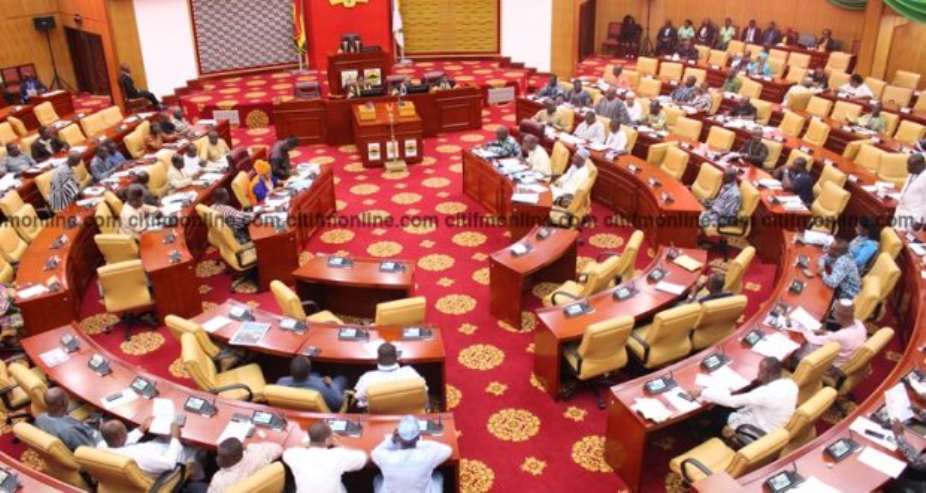The conduct of the business of the Parliament of Ghana, recently, demonstrates acts of political loyalty of the Members of the Legislative House. The two sides have not shown their nurtured loyalty to the State, and maturity to seek compromises when they do not have the numbers to approve of the 2022 budget statement. The rejection and subsequent approval of the 2022 budget statement were induced by the desires of the Members of the House to be faithful to the goals of their parties. The Members of the house, whether from the Majority or the Minority side, exhibited extreme loyalty to their parties by setting unaccustomed precedents that contravene the rules for conducting the business of the house.
It is not obligatory for the majority of the House to always side with the government by approving its deals. The Minority is not equally under compulsion to frustrate the government, as some of their party loyals wish, by rejecting its deals in the house. The House has been inefficient in working together as it failed to seek harmony on many occasions. The House needs to learn from happenings that divided it in 2021 and begin to build consensus.
As a lean Parliament, the House has not shown its ability to negotiate and tap the best capabilities and energies of the Members from both sides. Both sides of the House prefer to utilize the least opportunity available to pursue the interest and wishes of the members of their parties: for the Majority, it is to approve of the deals of government regardless of their nature while the Minority has a duty to frustrate the business of government. The political loyalty exhibited in the House by Members is conspicuous to demonstrate the effect of an uncompromising House. The lean nature of the current house should have induced ideological tolerance that elicit consultations from the Majority and cooperation of the Minority. The current circumstances should have created room for negotiations on matters that divide the House, and those that need voting to arrive at a decision. But the House missed the opportunity by ignoring the power of dialog to settle some issues.
There cannot be any better time to instill the spirit of consensus building in the Members of Parliament than now. The closeness of the number of Majority and Minority Members presents a conducive ground for compromises. Even the decision of the House to choose the Speaker from a non-majority party meant they could resolve issues through consensus building.
Yet the actions of both the Majority and Minority suggest consensus building is a difficulty, and a goal that is not within their reach. Each of the two sides has a desire to take actions that project the interest of the parties they represent than maximizing the best efforts of each member in the Legislative House. Recent happenings in the House point to this conclusion as same opinion would be offered by every objective and critical-thinking person.
Relations may sour as there are conspicuous disagreeable appreciation of the laws governing the conduct of Parliamentary affairs. Such developments may not augur well for any future attempts to seek consensus from the feuding parties. As a growing democracy, precedents must be set for a possible political tolerance. The Parliament of Ghana is an agency that can lead in developing acts of political tolerance and consensus building.
By using extensive consultation in the decision-making of the House, the Parliament of Ghana could become a model democratic House on the continent. Other Parliaments may take a cue from the activities of the Ghanaian Legislative House. The spirit of excessive patriotism will also be neutralized in the end.
Members of the 8th Parliament have engaged in deeds that aim at fulfilling party aspirations in general than national goals. The frustrative actions of the Minority are not the desires of the masses neither are the actions of the majority the wills of the common people. The populace demand actions and decisions that place their welfare higher as a priority.
The current Parliament may be missing an opportunity to achieve the vision of the forefathers that is indicated in the supreme law of the land, the constitution, in Article 35 clause 6 (a). The State is charged to take appropriate measures to foster a spirit of loyalty to Ghana that overrides sectional loyalties. That spirit of loyalty is about consensus building that ensures optimal use of resources by all governments and not excessive loyalty to parties.
Emmanuel Kwabena Wucharey
Economics Tutor, Advocate and Religion Enthusiast.





 Ensure private schools employ professional teachers, not SHS graduates — Xandy K...
Ensure private schools employ professional teachers, not SHS graduates — Xandy K...
 Alan Kyeremanten was the brain behind Ghana Card not Bawumia — Hopeson Adorye
Alan Kyeremanten was the brain behind Ghana Card not Bawumia — Hopeson Adorye
 I'm not running for office for power prestige, I just want to solve Ghana’s prob...
I'm not running for office for power prestige, I just want to solve Ghana’s prob...
 Provide immediate assistance to our displaced residents — Oda Nkwanta residents ...
Provide immediate assistance to our displaced residents — Oda Nkwanta residents ...
 Send nurses abroad; it’s a better option than being unemployed in Ghana — NDC Pa...
Send nurses abroad; it’s a better option than being unemployed in Ghana — NDC Pa...
 Bawumia stole free tertiary education for Persons with Disabilities from NDC’s 2...
Bawumia stole free tertiary education for Persons with Disabilities from NDC’s 2...
 Ejisu by-election: Anger is bound to occur but return to your 'sweet home' — Nan...
Ejisu by-election: Anger is bound to occur but return to your 'sweet home' — Nan...
 Limited voters registration: Don't allow politicians to engage your minors for p...
Limited voters registration: Don't allow politicians to engage your minors for p...
 Ferry on Oti River breaks down; drivers and passengers stranded
Ferry on Oti River breaks down; drivers and passengers stranded
